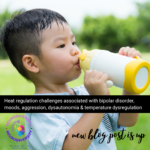Heat regulation, bipolar, mood-disorders It’s been a hot one around here already, and apparently, we are going to hit an unprecedented heatwave this summer, or that’s what B keeps telling me anyway. In the scorching embrace of summer, our bodies are pushed to their limits as the sun’s radiance engulfs us in its fiery glow. […]
Things that help create mood disorders.
Food in America
Foods Banned in Europe but Readily Available in America: Examining Regulatory Differences Many moons ago, some of the very first interventions we tried were dietary. Feingold diet, gluten-free, dairy-free, corn free, and on and on and on until I monitored every single thing I fed my kids for dyes, chemicals, and toxicities. It was exhausting. […]
Mental Health in America
MENTAL HEALTH in America (and probably the rest of the world… my perspective) This week another mass shooting in a school by a child (almost adult) whose story is not yet fully known but already presumed mentally ill. The “he was different” conversations and the words “adoption, and fetal alcohol syndrome” have already been bounced […]
How Many Times…
How many times … I had reason tonight to go back over a series of blog posts about a program we had completed in 2011. As I was reading through the Brain Balance blog roll I realized we had actually finished that program with hope in our heart and a skip in our step. Okay perhaps we […]



